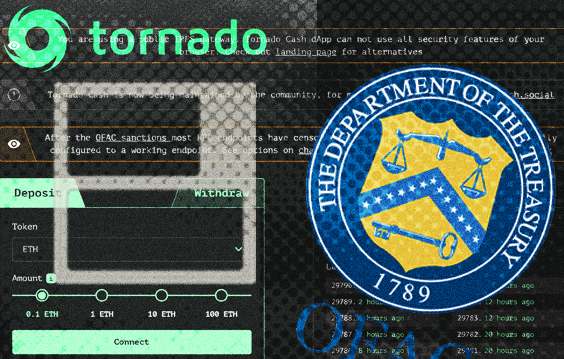
The Blockchain Association, a key advocate for the cryptocurrency industry, has recently intensified its support for Tornado Cash, a decentralized cryptocurrency mixing service, amid legal challenges against sanctions imposed by the U.S. Treasury's Office of Foreign Assets Control (OFAC).
OFAC first sanctioned Tornado Cash in August 2022, alleging that the mixer had been used to launder over $7 billion in cryptocurrencies since 2019. This included $455 million allegedly stolen by the North Korea-affiliated Lazarus Group.
The Blockchain Association supports six plaintiffs in a lawsuit against OFAC, challenging the sanctions imposed on Tornado Cash. The Association filed an amicus curiae brief to a U.S. appellate court on November 20, arguing that OFAC's action against Tornado Cash was unlawful, exceeded its statutory authority, and violated the U.S. Constitution. This marks the second amicus brief filed by the Association in this case. As the brief concludes:
"If allowed to stand, this overreach will have sweeping consequences – weakening the digital asset industry, jeopardizing law-abiding Americans' financial privacy, and effecting a vast expansion of OFAC’s power."
Marisa Coppel, senior counsel at the Blockchain Association, explained that OFAC should target individuals involved in illicit activities instead of outright banning tools like Tornado Cash.
Today we filed an amicus brief in the 5th Circuit appeal of Van Loon v. Treasury regarding OFAC’s sanctions against Tornado Cash.
— Blockchain Association (@BlockchainAssn) November 20, 2023
Read Senior Counsel @MTCoppel's thread below for more. 👇https://t.co/1pmSAt1Bds https://t.co/c5ScaTDr9N pic.twitter.com/e9ySvcKdeM
She highlighted the need for OFAC to recognize Tornado Cash as a neutral tool that can be used lawfully, suggesting that the focus should be on those who misuse such tools. This stance reflects a broader concern about privacy rights for law-abiding citizens and the overreach of regulatory authorities.
5/ OFAC’s authority only extends to persons or property…the Tornado Cash software is neither.
— Marisa Tashman Coppel (@MTCoppel) November 20, 2023
There is no owner.
No operator.
It functions autonomously.
And immutably.
The Blockchain Association argued that the correct approach would be for OFAC to seek legislative approval from Congress for banning crypto mixers such as Tornado Cash. They cautioned against stretching existing authorities and setting a dangerous precedent that could threaten the availability of various internet-based tools.
This perspective underscores the importance of a balanced and legally grounded approach to regulating the uniquely decentralized context of digital assets.
Tornado Cash (TORN) operates as a decentralized, non-custodial privacy solution on the Ethereum blockchain. It allows users to deposit ETH or ERC-20 tokens and withdraw them to a new address, making the connection between the initial deposit and withdrawal untraceable. This mechanism provides asset privacy, addressing transparency issues inherent in public blockchains.
The Blockchain Association maintains that Tornado Cash functions autonomously without an owner or operator, pointing to its independent operational nature. The Association's involvement in the legal dispute over the sanctions against Tornado Cash reflects critical issues at the intersection of cryptocurrency, privacy, and regulatory overreach. Its legal and advocacy efforts highlight the complexity of regulating decentralized digital tools and the need for a nuanced approach.
The Blockchain Association released its 2023 annual report on November 22. The report emphasizes the Association's dedication to "a future-forward, pro-innovation national policy and regulatory framework for the crypto economy," including the initiation of 14 working groups tackling diverse Web3 topics.
Its engagement with government entities in the past year has been substantial, encompassing "175 House and Senate meetings" and numerous discussions with White House officials, all aimed at influencing rulemakers to support digital asset innovation.

